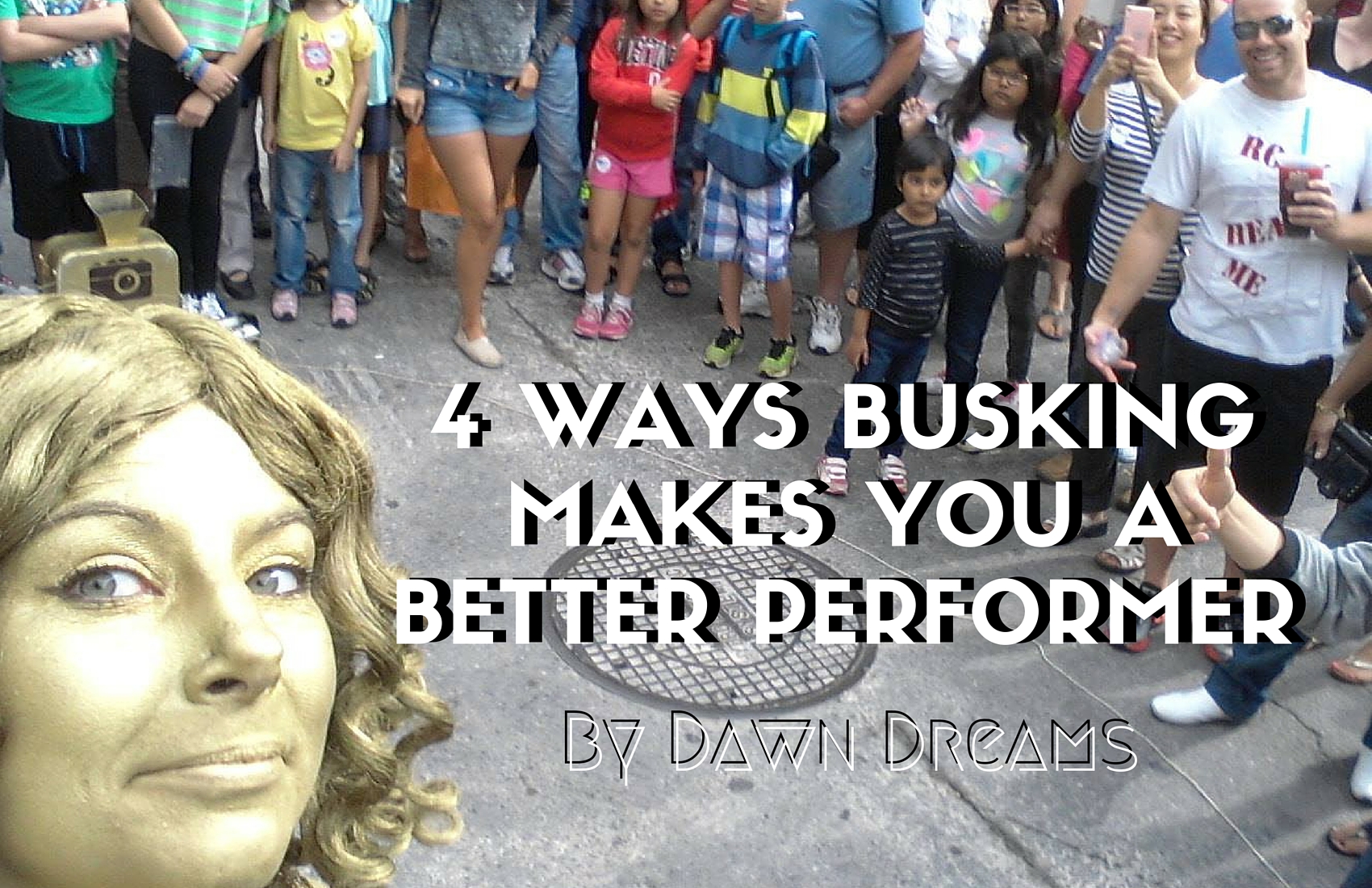Dawn at Edinburgh Fringe Festival – Photo by Andrew Brown
It’s been over a decade since I started street performing and it contributed greatly to my development as an artist. It helped that I joined The Busking Project in 2011. Watching show after show and seeing the full range of street performance gave me enormous perspective of the variations and adaptability of street artists.
You should know that I am an employee of the Busking Project, and, if you will excuse the shameless plug, I am now the face of the new app that will be released December 4th, 2015! Download it! It’s free!
No, really, watching street shows is the first lesson of street performance, and having this app will allow you to connect in person. Like Flow Arts, it’s a small world, and you’ll get to know great people with great talent if you start connecting.
The iPhone Busk App – Photo busk.co
Anyway, as a Flow Artist and a juggler, the most important performance experiences I have had were busking shows. I get immediate feedback from my audiences. If my work is interesting, funny, and worth watching they stay. If it’s not, they go.
Also, if done daily, a huge amount of time is devoted to working on performance. This gives me stamina, confidence and freedom to play with my crowds. Learning the art of street performance should be a step to every aspiring performer, if only as a test to understand your true capabilities as an artist.
Busking gives you an audience. Okay, okay, it’s more like you have to learn to take your audience from a random group of strangers who couldn’t care less about you. They will just walk past you as if you are no one. Let’s be clear, they are right! You are a nobody. You have to convince them of your talent. For this same reason, they are the best audience. If you can change people who don’t care to speak to you into people who are applauding and throwing money at you, you have done something right. The interaction between you and your audience is what is important in busking, secondary to all the tricks you do to get attention.
There is an adage in the street performer world: “What works on the street will work on the stage, but what works on a stage won’t work on the street”. It’s because on the stage your audience is already there, waiting for you and wanting to like you. They have hope. They are already committed to following the rules of your world.
When you’ve learned how to bring people into your world on the street corner consistently, your performance ability has leveled up. Your work will be more powerful in all contexts of performance. But, if you bring to the street the expectation that people will love the act you put on stage, you will be shocked and humbled very quickly. Bonus: You can be both practicing your performance skills and making money at the same time!
[/fusion_builder_column][fusion_builder_column type=”1_1″ background_position=”left top” background_color=”” border_size=”” border_color=”” border_style=”solid” spacing=”yes” background_image=”” background_repeat=”no-repeat” padding=”” margin_top=”0px” margin_bottom=”0px” class=”” id=”” animation_type=”” animation_speed=”0.3″ animation_direction=”left” hide_on_mobile=”no” center_content=”no” min_height=”none”][fbvideo link=”https://www.facebook.com/erinstephensjuggling/videos/10153101062325583/” width=”500″ height=”400″ onlyvideo=”1″]
Erin Stephens recently tried street performing at traffic lights in Peru.
2. Busking gives you confidence
Knowing your work through repetition helps you learn about trusting yourself. You learn to deal with various situations as they come up. You learn how to be street savvy. If you stay in one pitch, you begin to understand pedestrian traffic patterns and the ambience of a crowd in all kinds of different conditions. You learn how to read situations, or people, really well.
Your shows start developing a rhythm, timing and patterns of what works well with that audience. You can see the difference between days you feel strong and days you feel weak, and moments the crowd builds you up and moments where the crowd tears you down.
Repetition makes you realize that your show is getting good. It is also teaching you the difference between a good crowd, and a difficult crowd. Most of all, you learn that circumstances are about 50% of the outcome, and the other 50% is how you deal with those circumstances.
Let’s be clear, busking can be really hard. During one year of the Edinburgh Fringe Festival I experienced 20 of 26 days which were complete hell. Each day gave me a new problem. There was rain, amplification wars, I was shaking in my performance because my confidence was low, and of course I decided to give up on human statue, because it’s too passive in such a noisy, chaotic environment.
Then, on one of the last days, I had finally figured my act out. I bought an expensive amp, the rain cleared and I had managed a boost of courage. In that moment I went out proud and finally had a good circle of people gathered around me; I was full of optimism about my act, and a dog walked into my circle and literally pooped in the middle of the pitch! On the street, you have to accept that anything can happen.
The other street performer’s support in that time was so generous and kind. They have all been there. I look back on that festival as an incredible moment of my life that honestly changed everything for me.
When busking is tough, it is super rough, but you learn that you can get through those bad shows, laugh at your past self and chalk it up to a learning experience. Determination and failures make the work better over time and you learn how to deal with each of those situations with grace. Knowing this give you confidence in the following performances that you can handle anything.
3. You learn to improvise
Another phrase street performers say often is “Your first hundred shows don’t count”. It takes time to learn about the relationship between your act and the atmosphere around you. There will be variations in weather, time of day, cities and seasons. Improv is about being authentic in your work and knowing all the possibilities that could be. You can learn how to deal with them individually, but only over time. Dog poops on your pitch? Make jokes about it.
Busking is about sharing the moment. If you know all the 100 variables of how a situation could possibly play out, then you have 100 different possible courses of action. Once you know those courses of action, your improvisation improves and you can be more relaxed and authentic when the time comes that you need it.
4. You are self sufficient
Radical self-reliance is a principle at Burning Man and in street performance. First, you need to be capable of transporting all your gear. Then, you need to find a place to change into your costume (yes, I have changed behind dumpsters and in between cars). You will need your own amplification if you desire a soundtrack. You will need lights or fire if you are busking at night. You will have to pack your lunch and bring your water, and have everything you need. Hauling your gear across the city takes away your energy (or money for gas), so you better be ready to stay where you work. This type of self-reliance levels up your professionalism. You will always have everything you need, and you learn how to improvise anything else in a pinch. Doing a gig and they forgot to leave a plate of food for you? You are already in the habit of carrying food, so you got this. They forgot to provide you with a chair on a table to get on your stilts? You are now able to scan the location quickly to find that deco brick wall that will allow you to get up instead. Being self-reliant not only helps you, but it helps your clients during a paid gig not have to fuss with your needs if they are busy. This will pay you back in full when they are happy with your professionalism, hilariously created because you worked on the streets for so long!
So what are you waiting for? Go out there and try busking. You won’t regret it, even if you don’t become the world’s best busker. The Busking Project has been developing a resources page if you need more information on amplification or what cities buskers are performing in around the world. On my own blog you can also see a short essay I wrote on 5 types of street shows.
Heavy hats to you all!

